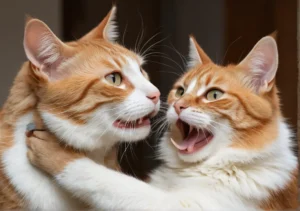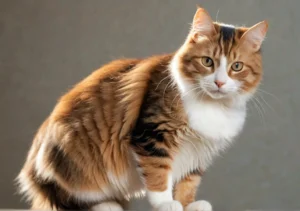Have you ever noticed your cat mysteriously closing doors around the house? It’s a common behavior that can leave pet owners puzzled. But fear not, we’re here to shed some light on why your feline friend might be exhibiting this curious habit.
So, why does your cat close doors? In this blog post, we’ll explore the possible reasons behind your cat’s door-closing antics. From instincts to territorial behavior, we’ll delve into the fascinating world of feline behavior to help you better understand your furry companion.
Curiosity or Playfulness
Cats are known for their insatiable curiosity and playful nature, which may explain why your feline friend is keen on closing doors. Curiosity drives cats to explore every nook and cranny of their surroundings, and closing doors provides them with a new puzzle to solve. It’s like a challenging game for them, where they get to test their agility and problem-solving skills.
Furthermore, playfulness plays a significant role in this behavior. Cats are natural hunters, and closing doors can mimic the act of trapping prey or hiding from predators. So, next time you find your cat shutting doors behind them, remember that it might be just another playful adventure for them.
If you want to engage your cat’s curiosity and playfulness positively, consider providing them with interactive toys or engaging in enriching activities that stimulate their minds and bodies. This can help satisfy their need for exploration and play, reducing the likelihood of them resorting to closing doors for entertainment.
Territorial Instincts
In addition to their playful antics, cats also have strong territorial instincts that can drive them to close doors. Marking territory is a common behavior among cats, and shutting doors can be a way for them to claim a specific space as their own. By closing doors, cats may be signaling to other animals or even humans that this area belongs to them.
Moreover, closing doors can also help cats establish a sense of security in their environment. By controlling access to certain areas, cats can create a safe haven where they feel protected and undisturbed. This behavior is especially common in multi-cat households, where cats may close doors to seek privacy or avoid conflicts with other pets.
To respect your cat’s territorial instincts, provide them with designated spaces that they can claim as their own. This can include cozy beds, scratching posts, and high perches where they can observe their surroundings. By creating a comfortable environment for your cat, you can help alleviate their need to close doors to assert their territory.
For further insights into cat behavior and how to effectively address your cat’s door-closing habits, consider consulting with a veterinarian or animal behaviorist. They can offer personalized advice and strategies to ensure that your furry companion feels happy and secure in their home.
Remember, understanding the reasons behind your cat’s behavior is the first step towards building a strong and harmonious bond with your feline friend.
Seeking Privacy or Solitude
Cats are known for their independent nature, and sometimes they close doors to seek privacy or solitude. If your cat feels overwhelmed by a busy household or noise, closing a door can provide them with a quiet and safe space to relax. Cats, like humans, need their alone time to recharge, and closing a door can signal that they need some time alone. Providing your cat with a cozy hiding spot or a quiet room where they can escape to can help satisfy their need for privacy and solitude.
Mimicking Human Behavior
It’s fascinating to note that cats are natural imitators and may close doors to mimic human behavior. Cats are highly observant creatures and often pick up on the actions of their human companions. By closing doors, cats may be trying to imitate the behavior they have seen their owners do. This mimicry can be a way for cats to bond with their owners or simply a way to participate in activities that they find interesting. If your cat is closing doors, it could be their way of trying to be more like you. Consider providing them with interactive toys or games to engage their natural curiosity and intelligence further.
Additional Unique Insight: Playful Behavior
In some cases, cats may close doors as part of their playful behavior. Closing and opening doors can be a fun and engaging activity for a cat, providing them with mental stimulation and physical exercise. If your cat seems to be closing doors as a form of play, consider providing them with toys or puzzles that offer similar interactive elements. Encouraging this playful behavior can help keep your cat entertained and mentally stimulated.
Environmental Factors
Have you ever wondered why your cat loves closing doors behind them? Well, environmental factors could be playing a significant role in this quirky behavior. Changes in routine, such as a new work schedule or rearranging furniture, can cause stress for your feline friend. Cats are creatures of habit, and any disruptions in their environment can lead to unusual behaviors, like closing doors.
To help address this door-closing behavior, try to create a calming and consistent environment for your cat. Establish a routine that includes regular playtime, feeding schedules, and quiet time for your pet to unwind. Providing enough mental and physical stimulation can also help reduce stress and prevent your cat from seeking out unusual activities like door closing.
Additionally, consider if there are any specific triggers in your home that might be causing your cat to close doors. Loud noises, new pets, or changes in the household can all contribute to stress and anxiety in cats. By identifying and addressing these triggers, you can help create a more peaceful and harmonious environment for your furry friend.
For more insights on understanding your cat’s behavior, check out this helpful resource on cat behavior and environmental enrichment: Cat Behavior and Enrichment Guide.
Training and Modification Techniques
If your cat’s habit of closing doors is becoming a nuisance, fret not! With some patience and training, you can help modify this behavior and redirect your cat’s energy towards more positive activities. One effective technique is to provide alternative outlets for your cat’s energy, such as engaging toys, puzzle feeders, or interactive play sessions.
When you catch your cat in the act of closing a door, gently redirect their attention to a more appropriate behavior. Offer treats or praise when your cat engages in desired behaviors, like playing with their toys or using a scratching post. Consistency is key when training your cat, so be sure to reinforce positive behaviors each time they occur.
Another helpful tip is to make the act of closing doors less appealing to your cat. You can try using door stoppers or deterrent sprays on doors to discourage this behavior. It’s essential to be patient and understanding with your cat during the training process, as it may take time for them to unlearn this habit.
By implementing these training and modification techniques, you can help your cat break the habit of closing doors and create a happier and more harmonious home environment for both you and your feline companion.
Fun Facts About Feline Behavior
Cats are fascinating creatures with unique behaviors that often leave us marveling at their intricate ways. When it comes to door-related antics, there are several fun facts to consider:
Curiosity Rules: Cats are naturally curious animals, and this curiosity can often lead them to investigate closed doors. Your cat may simply be trying to satisfy their inquisitive nature by exploring what lies behind the closed door.
Territorial Instincts: Cats are territorial animals and may view closed doors as a boundary that they want to protect. By closing doors, your cat may be trying to establish their territory and keep potential intruders out.
Playful Pranks: Cats are known for their mischievous behaviors, and closing doors could be their way of playing a fun game with you or attempting to get your attention. It’s their way of adding a playful twist to their daily routines.
By understanding these fun facts about feline behavior, you can gain insight into why your cat may be closing doors. Embracing your cat’s unique personality and behaviors can help strengthen the bond between you and create a harmonious living space for both of you.
For more information on feline behavior and how to enhance your relationship with your cat, check out this informative resource from the American Association of Feline Practitioners: Understanding Cat Behavior.
Alex, a passionate animal lover, has experience in training and understanding animal behavior. As a proud pet parent to two dogs and three cats, he founded AnimalReport.net to share insights from animal experts and expand his knowledge of the animal kingdom.




